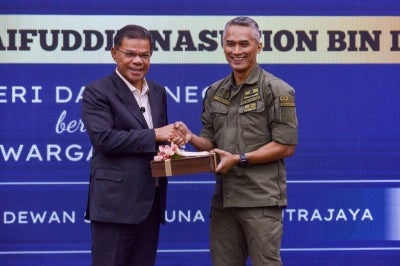November's top six developments: Key stories and insights

SHAH ALAM - November has been a month rich in varied and insightful developments across Malaysia, leading to a deeper understanding of several key issues.
In this review, we highlight six major developments that have shaped the national discourse and impacted various sectors:
National Service Training Programme (PLKN) updates
Eligibility and age limit: Targeting individuals born in 2007, PLKN 3.0 sets a maximum age limit of 35 years, with the Defence Ministry clarifying selection criteria and addressing public concerns about the age determination process.Two-phase implementation: The programme, reinstated after being abolished in 2018, includes two phases focusing on enhancing co-curricular activities and incorporating students in different educational stages.
Phase 1 details: Defence Minister Datuk Seri Mohamad Hasan detailed Phase 1's involvement, which would encompass Form Four students under the Education Ministry's curriculum. This phase will strengthen co-curricular activities like police cadets, firefighters, and scouts.
Phase 2 inclusion: Students exempted from Phase 1, notably Form Five students preparing for the Sijil Pelajaran Malaysia (SPM) examinations, will join Phase 2 at existing National Reserve Army training camps, as specified by Mohamad.
Social media misinformation: Recently, social media circulated misinformation suggesting participants in the new phase of PLKN would be aged between 16 and 35, leading to widespread misconceptions.
Syed Saddiq's conviction
Trial and verdict: High Court Judge Datuk Azhar Abdul Hamid found Muar MP Syed Saddiq Abdul Rahman guilty on all four charges of corruption and misappropriation of funds within Bersatu's Armada, following a trial featuring testimony from 30 prosecution witnesses.
Background: Syed Saddiq faced allegations of abetting the misappropriation of RM1 million from Armada's funds, entrusted to former Armada assistant treasurer Rafiq Hakim Razali. Additionally, he was accused of misappropriating RM120,000 from Armada Bumi Bersatu Enterprise's account and engaging in two counts of money laundering.
Legal representation: Deputy public prosecutor Datuk Wan Shaharuddin Wan Ladin represented the prosecution, while Syed Saddiq was defended by lawyer Gobind Singh Deo during the trial.
Anti-Smoking Bill passed
Legislative process: The Dewan Rakyat passed the Control of Smoking Products and Public Health Bill, which underwent significant debate and amendment, particularly concerning provisions linked to the Generational Endgame (GEG).
Debate and provisions: A two-day debate involving 27 MPs preceded the bill's passage. A notable contention emerged, with a majority advocating for the reinstatement of provisions linked to the GEG that were initially excluded from the bill.
Reintroduction and removed provisions: The bill underwent re-tabling in the Dewan Rakyat, dropping specific elements related to banning the sale of tobacco products and cigarettes, as well as prohibiting smoking for individuals born on or after Jan 1 2007.
Constitutional challenge and decision rationale: Health Minister Dr Zaliha Mustafa highlighted that the amendment decision regarding the GEG provision stemmed from concerns related to a potential challenge based on Article 8 of the Federal Constitution, specifically addressing the right to equality.
Public criticism and government response: The withdrawal of the GEG provision prompted criticism directed at Dr Zaliha and the government, drawing attention and feedback from various segments of society.
Debate over polygamy proposal in Malaysia
Controversial suggestion: Pas politician Datuk Seri Tuan Ibrahim Tuan Man's proposal for single women over 30 to consider polygamous marriages sparked a national conversation about gender equality, societal norms, and the role of marriage in Malaysian society.
Controversial nature of polygamy: Polygamous marriage, permitted for Muslims in Malaysia, remains a contentious and sensitive issue. Muslim conservatives argue for its validity within Islamic teachings, while progressives contest its relevance in the modern era.
Support and criticism: Tuan Ibrahim's suggestion received mixed reactions. He faced criticism from various quarters, especially from female MPs. Youth and Sports Minister Hannah Yeoh questioned why being single was perceived as a problem, while DAP MP Yeo Bee Yin labeled the proposal as sexist and insulting to women.
Defensive stance and justification: Tuan Ibrahim defended his stance, citing data indicating difficulty finding a husband as a significant reason for women remaining unmarried. However, critics viewed this perspective as inherently sexist and offensive.
Response from the ministry: Women, Children, and Community Development Minister Datuk Seri Nancy Shukri refrained from taking sides in the debate but highlighted the government's focus on addressing declining fertility rates in the country, which hit a 50-year low in 2022.
Muhyiddin's political U-turn
Leadership reversal: Former prime minister Tan Sri Muhyiddin Yassin's unexpected reversal on withdrawing from Bersatu's leadership race raised questions and speculation about his political motives and future ambitions.
Strategic manoeuvring or genuine change: Analysts have speculated that this U-turn might have been a tactical move orchestrated to gauge the extent of support within the party. The abrupt change in stance raised questions regarding the authenticity of the decision and its underlying motives.
Former minister's perspective: Former minister Datuk Seri Salleh Said Keruak weighed in on the matter, expressing doubts about Muhyiddin's intentions. He pondered whether this move was a calculated strategy to deceive internal adversaries or camouflage his true aspirations, especially concerning current Prime Minister Datuk Seri Anwar Ibrahim.
Ambitions for political reemergence: Muhyiddin's resignation in Aug 2021 didn't dampen his ambitions to return to power. Speculations abound that his recent actions might be part of a larger plan to position himself favourably within Bersatu and possibly the broader political landscape. The abrupt change in Muhyiddin's decision-making within the party has sparked intrigue, with observers questioning the authenticity of his intentions and the potential repercussions on Bersatu's internal dynamics and Malaysian politics at large.
Anwar’s statement on allocation negotiations
Funding strategy: Anwar's emphasis on negotiation before disbursing parliamentary allocations and his commitment to addressing issues at Felda settlements marks a strategic approach to managing government resources and addressing constituent needs.
Past instances of negotiations: Drawing from past experiences, Anwar highlighted instances when negotiations with Prime Minister Datuk Seri Ismail Sabri led to months-long discussions before agreement on opposition allocations. He emphasised the need for constructive discussions, referring to ongoing talks with Deputy Prime Minister Datuk Seri Fadillah Yussof.
Allocation disbursement strategy: Anwar stressed his intention to channel parliamentary allocations directly to the people through government development programmes rather than providing funds directly to elected representatives.
Fadillah's statement and pending discussions: Earlier, Fadillah mentioned that opposition MPs' allocations hinge on a meeting with opposition leader Datuk Seri Hamzah Zainuddin, indicating that these allocations could be determined post-discussions.
Commitment to felda settlement issues: Anwar expressed his commitment to addressing long-standing problems at Felda settlements, particularly regarding second and third-generation housing issues, underscoring the persistence of these concerns over the years.
Download Sinar Daily application.Click Here!















